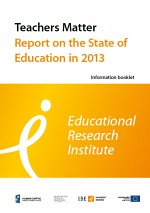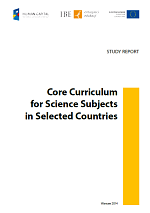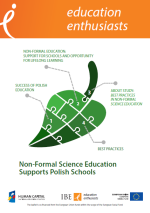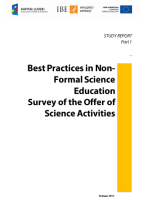Teachers Matter. Report on the State of Education in 2013. Information booklet
- Published on Monday, 26 January 2015 10:10
 The information booklet summarises the main points of the "Teachers Matter. Report on the State of Education in 2013" which, as the title suggests, focuses on the portrait of Polish teachers. Teachers form probably the largest professional group in Poland. It is essential from the perspective of the country’s socio-economic development. High educational standards and the education level of society are currently key factors determining the civilisation advancement and development prospects of individual countries - these standards largely depend on teachers. The generic portrait of the Polish teacher does exhaust all aspects of this professional group. It demonstrates stark internal differences determined by teachers’ substantial specialisation. To create the comprehensive picture of Polish teachers, the report examines this group in the context of the specific profile of their subjects.
The information booklet summarises the main points of the "Teachers Matter. Report on the State of Education in 2013" which, as the title suggests, focuses on the portrait of Polish teachers. Teachers form probably the largest professional group in Poland. It is essential from the perspective of the country’s socio-economic development. High educational standards and the education level of society are currently key factors determining the civilisation advancement and development prospects of individual countries - these standards largely depend on teachers. The generic portrait of the Polish teacher does exhaust all aspects of this professional group. It demonstrates stark internal differences determined by teachers’ substantial specialisation. To create the comprehensive picture of Polish teachers, the report examines this group in the context of the specific profile of their subjects.
Download: Teachers Matter. Report on the State of Education in 2013. Information booklet [pdf, 1.6 MB]
.Core Curriculum for Science Subjects in Selected Countries. Study report.
- Published on Friday, 05 December 2014 13:22

The aim of the study was to compare the meaning of scientific reasoning skills and use of the scientific methods across curricula of selected European countries. This objective was achieved by comparing the Polish science core curriculum at the low secondary school and the first class of higher secondary school with corresponding documents of the five selected European countries – England, Czech Republic, Estonia, Finland and France. Countries were selected for comparison guided by the results of the PISA survey in parts of Science in 2006 and economic status measured by the height of GDP. Similarities and differences have been identified in the structure and content of these documents, with special attention paid to valuable solutions, presented in curricula of studied countries. Those solutions promote the acquisition of skills in using the scientific method, which could be applied in the Polish National Core Curriculum.
Download the report [pdf, 0.8 MB]
.Non-Formal Science Education Supports Polish Schools
- Published on Thursday, 23 October 2014 16:35
One of the important means of support for teachers in solving such problems is – apart from relevant forms of professional improvement – wide opening of schools onto non-formal science education. It constitutes valuable supplementation of science education at schools. Non-formal education also plays another important role – it popularizes and promotes the principle of lifelong learning among pupils; this principle is implemented in Poland in an insufficient degree. A statistical adult Pole, after completion of formal education, educates himself and develops his professional skills much less frequently than an average European.
Non-formal education also plays another important role – it popularizes and promotes the principle of lifelong learning among pupils; this principle is implemented in Poland in an insufficient degree. A statistical adult Pole, after completion of formal education, educates himself and develops his professional skills much less frequently than an average European.
Centres of non-formal education, open for everybody, from schoolchildren to adults at any age, may change these, unfavourable for our country, statistics.
Download "Non-Formal Science Education Supports Polish Schools" [pdf, 2.8MB]
.Best Practices in Non-Formal Science Education
- Published on Monday, 14 July 2014 03:18
 The report “Best Practices in Non-Formal Science Education. Survey of the Offer of Science Activities” is based on the studies conducted by Research Institute Millward Brown SMG/KRC S.A. for the Educational Research Institute. The main objective of the study was to determine the manner in which the offer of science activities addressed by centres of non-formal education to groups of pupils supervised by teachers may contribute to promoting and developing scientific reasoning, an ability that is essential in science education. The research also allowed for identification of examples of best practices in the area in question.
The report “Best Practices in Non-Formal Science Education. Survey of the Offer of Science Activities” is based on the studies conducted by Research Institute Millward Brown SMG/KRC S.A. for the Educational Research Institute. The main objective of the study was to determine the manner in which the offer of science activities addressed by centres of non-formal education to groups of pupils supervised by teachers may contribute to promoting and developing scientific reasoning, an ability that is essential in science education. The research also allowed for identification of examples of best practices in the area in question.
Results of both stages of the research indicate that non-formal education centres in Poland have a significant potential and may be considered a valuable addition to the sector of formal education. Almost half of the centres that participated in the ERI research in 2011 define their range of work as regional in the area of a voivodeship and one third of them as national. They mostly focus on cyclical and repetitive activities, which allow more groups to come back to the centre. The offer of the centres surveyed by the ERI associates includes, in the greatest part, activities supporting science, biology and geography. The offer of physics and chemistry is relatively poorer, which may be related to higher costs and smaller number of interested pupils (science or biology classes are addressed to preschool and primary school pupils). The didactic offer is usually based on in-house programmes; one in five centres prepares classes based on the curriculum. The methodology of classes is varied – centres not only offer expository activities (lectures, showing round the museum exposition), but also activities that potentially support development of abilities important in science education (workshops, labs).
Download "Best Practices in Non-Formal Science Education. Survey of the Offer of Science Activities" [pdf, 1.6MB]
.






